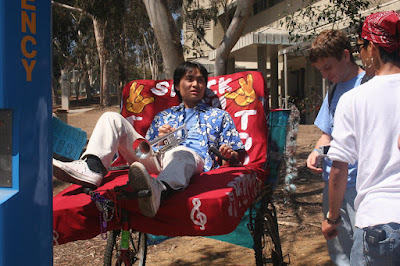 CMRR
CMRR graduate student
Eitan Yaakobi (in photo above) and CMRR visiting graduate student
Marco Papaleo have been selected as Marconi Scholars for 2009 by the Marconi Society. The honor includes a $4,000 cash prize, which will be presented at the
Marconi Society Award Dinner in Bologna, Italy, on October 9, 2009.
Eitan Yaakobi received his B.A. and M.Sc. degrees from the Technion - Israel Institute of Technology, Haifa, Israel, in 2005 and 2007, respectively, from the Computer Science Department. He is currently a Ph.D. candidate in Electrical and Computer Engineering at the University of California, San Diego, where he is associated with the Center for Magnetic Recording Research (
CMRR). His advisors are Professor
Paul Siegel, Professor
Jack Wolf and Professor
Alexander Vardy. His research interests include algebraic error-correction coding, coding theory, and their applications for digital data storage, and in particular for flash memories.
According to Yaakobi's reserach profile:
"Flash memories are, by far, the most important type of nonvolatile computer memory in use today. They are employed widely in mobile, embedded, and
mass-storage applications, and the growth in this sector continues at a
staggering pace. In this research we mainly focus on coding for flash memories
in order to improve the reliability, capacity and endurance of the memory."
Marco Papaleo is a visiting graduate student under Professor Paul H. Siegel and Professor Jack K. Wolf. He received his B.S. and M.Sc. degrees (summa cum laude) in telecommunication engineering from the University of Bologna, Italy, in 2003 and in 2006, respectively. He received an award for one of the three best theses in telecommunication engineering from University of Bologna for the academic year 2004-2005. In January 2006, he joined the Advanced Research Center on Electronic Systems for Information and Communications Technologies "Ercole De Castro" (ARCES) at the University of Bologna, where he also began his Ph.D. studies in 2007. In the summer of 2008 he was a visiting Ph.D. student at the German Aerospace Center (DLR) Institute of Communications and Navigation in Wessling. He was involved in the design and analysis of LDPC convolutional codes. In 2006, he was a visiting affiliate student at the University College of London (UCL), in England. His current research activities are focused on the next generation wireless telecommunication systems, for both terrestrial and satellite networks. In particular, he is interested in the design and performance
evaluation of error control coding (with emphasis on packet level coding).
Got a moment? Check out the
CMRR Winter 2009 Report here.
(The Marconi prize also includes $1,000 to help defray travel expenses to the event in Bologna, Italy...hopefully some of that money can be used for buying food in Bologna...which is a stand-out food destination, even in Italy, where almost all the food is good.)






































